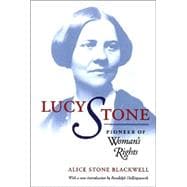Lucy Stone's biography is all the more impressive because she has been largely left out of the history of women's suffrage. Her leadership came in a form that was not grandstanding or shocking but personal and mentoring. Her daughter's book provides a vivid, unsentimental portrait of growing up female in rural Massachusetts in the nineteenth century, of earning a college degree, and of beginning a lifelong advocacy for basic civil rights for all Americans.
Often facing hostile audiences, Stone lectured all over the country, and she led the call for the first national woman's rights convention, which took place in Worcester, Massachusetts, in 1850. She brought other leaders -- for example, Susan B. Anthony and Julia Ward Howe -- to the c









